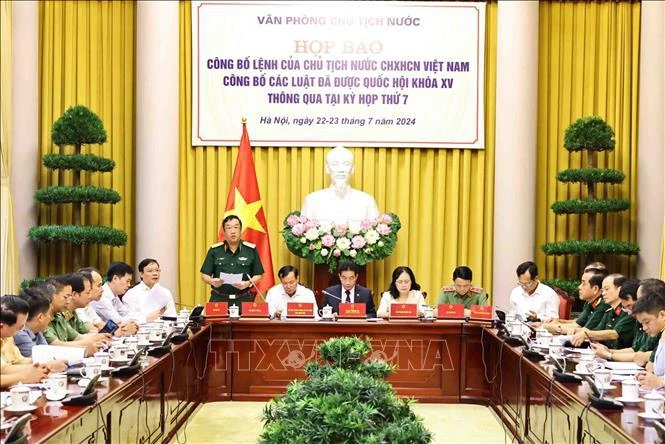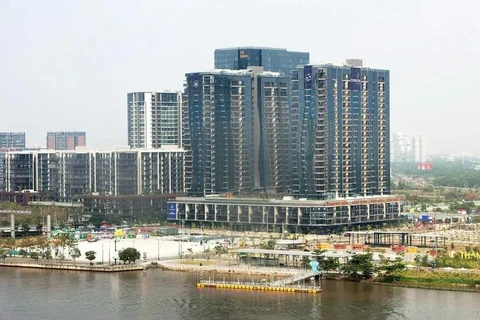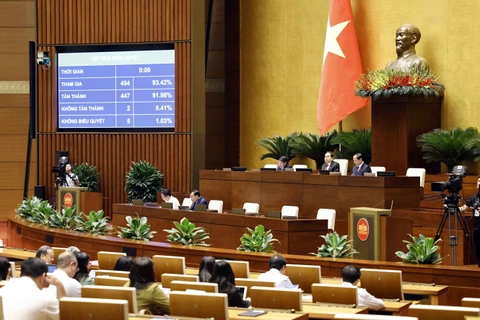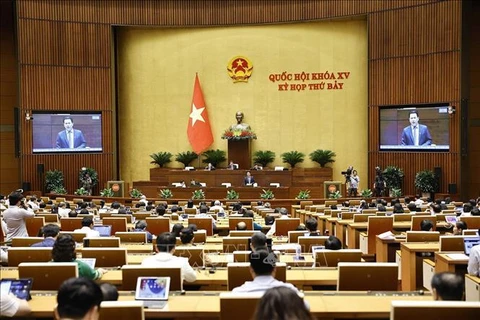
Hanoi (VNA) – The Presidential Office held a press conference on July 22 to make public the State President’s order to announce the laws that were approved by the 15th National Assembly at the recent seventh session.
The laws consist of the revised Law on Organisation of People's Courts, the 2024 Law on Road Traffic Order and Safety, the 2024 Law on Archives, the Law on Management and Use of Weapons, Explosive Materials, and Support Tools, the Law on Defence, Security Industries and Industrial Mobilisation, and the law on amendments and supplementations to some articles of the 2024 Law on VIP Protection.
The revised Law on Organisation of People's Courts comprises nine chapters with 152 articles and will take effect from January 1, 2025.
It contains some new contents related to the position, role, tasks and power of the people's courts, the reform of the courts' apparatus, the establishment of specialised first-instance courts, and the national judge selection and supervision council, among others.
Notably, the law has a new chapter on the organisation of trials which includes regulations on the random selection of judges and jurors for trials, and the methodology for organising trials at courts.
Also coming into force from January 1, 2025, the Law on Road Traffic Order and Safety has nine chapters with 89 articles, aiming to create a legal basis for ensuring road traffic order and safety, protecting commuters' life and health safety, and helping build an orderly, disciplined and secured society, thus contributing to the protection of human rights and citizens' rights in line with the 2013 Constitution and the international treaties to which Vietnam is a party.
Meanwhile, the Law on Archives is comprised of three chapters with 65 articles and will become effective from July 1, 2025. One of the major policies it focuses on is the management of electronic archives to meet the requirements of digital transformation and e-Government development.
The Law on Management and Use of Weapons, Explosive Materials, and Support Tools, to be effective from January 1, 2025, features eight chapters with 75 articles. It is part of efforts to improve mechanisms, policies, processes, and administrative procedures while settling difficulties, obstacles and problems arising during the enforcement of legal regulations related to the management and use of weapons, explosives, and support tools so as to ensure its consistency with relevant laws and at the same time create a legal basis for the state management and the prevention and combat of crimes and violations of laws on weapons, explosives, and support tools.
The Law on Defence, Security Industries and Industrial Mobilisation, comprising seven chapters with 86 articles, will be effective from July 1, 2025. It aims to complete mechanisms and policies serving the building and development of defence and security industries as well as industrial mobilisation in the immediate and long terms, ensuring specific policies for extremely important areas of defence and security industries.
It is expected to promote the role, functions, and tasks of defence and security industries along with industrial mobilisation in ensuring weapons, technical equipment, and professional means for the people's armed forces.
The law on amendments and supplementations to some articles of the Law on VIP Protection, scheduled to take effect from January 1, 2025, aims to meet requirements in reality after five years of implementing the VIP Protection Law and resolve shortcomings and problems arising during its enforcement.
Notably, according to the law, the permanent member of the Party Central Committee’s Secretariat, Chief Justice of the Supreme People’s Court, and Prosecutor General of the Supreme People's Procuracy are added to the persons entitled to guarding./.






















